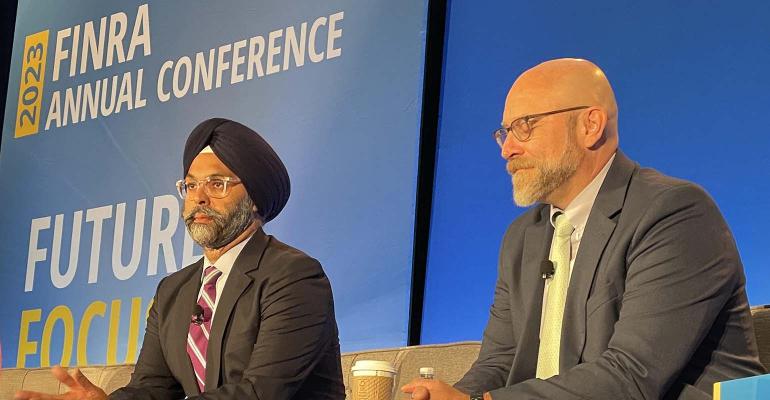In recent months there has been an uptick in advisors using generative artificial intelligence tools when forming recommendations for clients, but users of that tech need to be aware that any AI-generated recommendations still fall under the SEC's Regulation Best Interest (Reg BI). Nicole McCafferty, a senior director with FINRA’s National Cause and Financial Crimes Detection Programs, gave that advice to attendees of the regulator’s annual conference in Washington, D.C., this week.
“We have firms that use AI tech to generate really customized recommendations for a customer,” McCafferty said. “But sometimes firms think that because it’s a computer system generating those recommendations that they’re not subject to Reg BI.”
McCafferty participated on a panel assessing Reg BI as the industry approaches the three-year anniversary of the rule first going into effect. The theme of assessing AI’s influence on wealth management pervaded through many of the sessions at FINRA’s conference. On Tuesday, SEC Chair Gary Gensler revealed commission staff were weighing recommendations on rules for predictive data analytics conflicts, while regulators and C-suite compliance mulled whether “the machines were indeed coming for our jobs”.
While AI’s use in the industry is not entirely new—for example its helped firms weed out fraud and misconduct before now—previously it was not applied to the Reg BI recommendation space, according to Julie Glynn, a managing director and general counsel for JPMorgan Chase Wealth Management. Kerry Gendron, a senior vice president of member supervision, analytics, innovation & solutions with FINRA, also pointed out that FINRA was using AI to triage and find cases that involve real customer harm.
But Glynn found Reg BI recommendations to be trickier. While AI can be harnessed to help clients find the right products or account types, firms using it in a self-directed way could be exposing themselves to Reg BI requirements, even if they don’t think they’re doing so.
“So firms need to be cautious about it,” Glynn said. “But I think firms will do it, and you’re seeing firms do it now, in any event.”
Some firms may use generative AI and not even realize they’re doing so, according to Wendy Lanton, the chief compliance officer for Herold & Lantern Investments. An advisor might log in to software that generates ideas for them as an investment professional, but that advisor may not understand the tool is using AI to create suggestions.
“Social media uses some kinds of AI as well, so if you’re using that to get prospects or do marketing or advertising, it’s here and it’s kind of hiding,” Lanton said. “Just be mindful that you’re using it and it could escalate to some kind of best interest standard.”
In other Reg BI-related developments, Chris Kelly, FINRA's acting enforcement head, said registrants could expect more cases relating to “substantive” Reg BI violations, compared with cases related to Form CRS filings or failures to update procedures despite regulators’ warnings.
Kelly said the enforcement division already brought half a dozen cases for brokers and/or firms violating the care or disclosure obligations of Reg BI. Recently, FINRA expelled the broker/dealer SW Financial for making “material misrepresentations'' and omitting information on private placements and pre-IPO securities and violating the rule’s disclosure mandates. Kelly said to expect similar cases in the coming year.
But Reg BI isn’t the only fiduciary-related concern for firms and their compliance staff; state regulators at the North American Securities Administrators Association are still likely to release a model rule this year and the Labor Department is mulling its own revised fiduciary rule. Also, Massachusetts’ fiduciary rule is trying to survive a state court appeals process, according to Evan Charkes, a managing director and associate general counsel at Bank of America and the chief counsel for the firm’s Merrill Lynch Private Wealth advisors.
He suspected that over the next five years, there will be a push and pull between firms having the resources to meet every compliance need. If they couldn’t, Charkes questioned whether that finding would yield an enforcement case. “Over the next few years, it’s going to be the most challenging part for us as an industry as this rule matures to the point that it moves past examinations fully into the enforcement mechanism,” he said.

